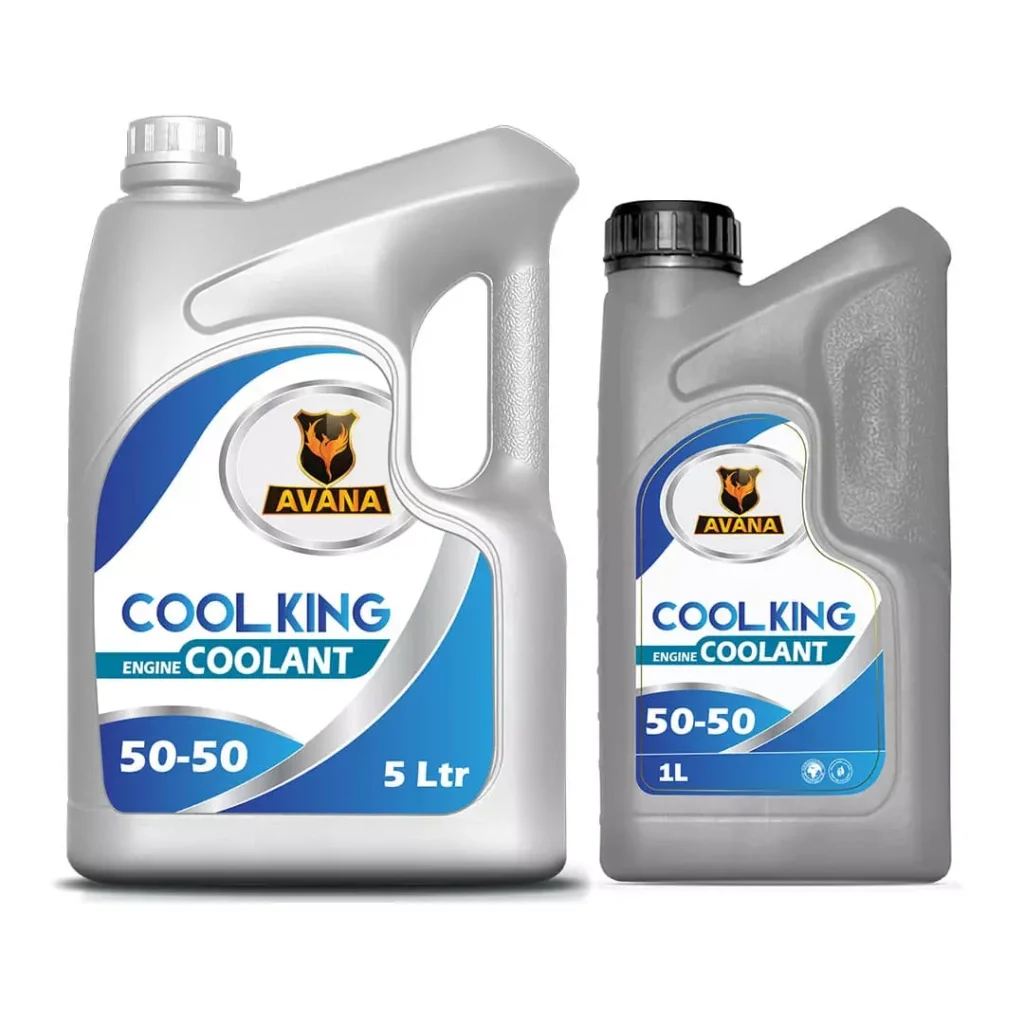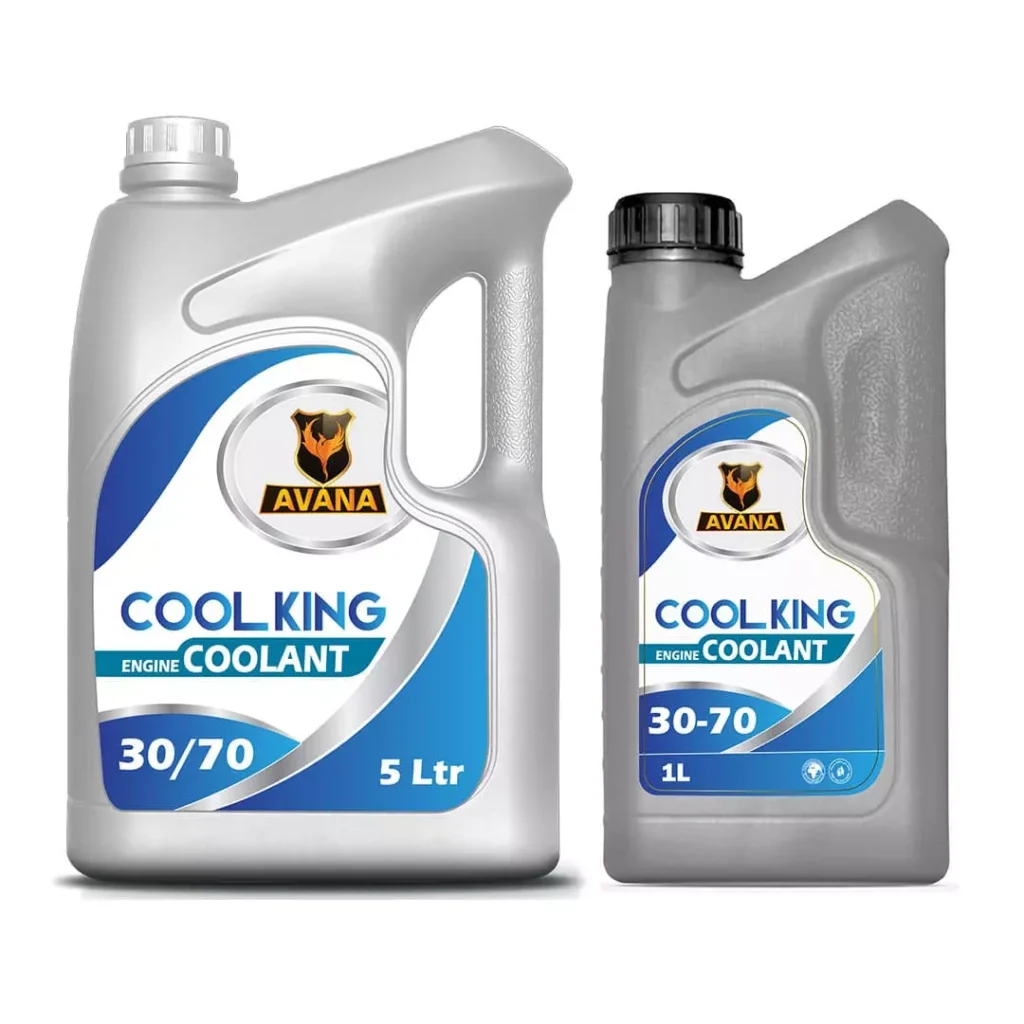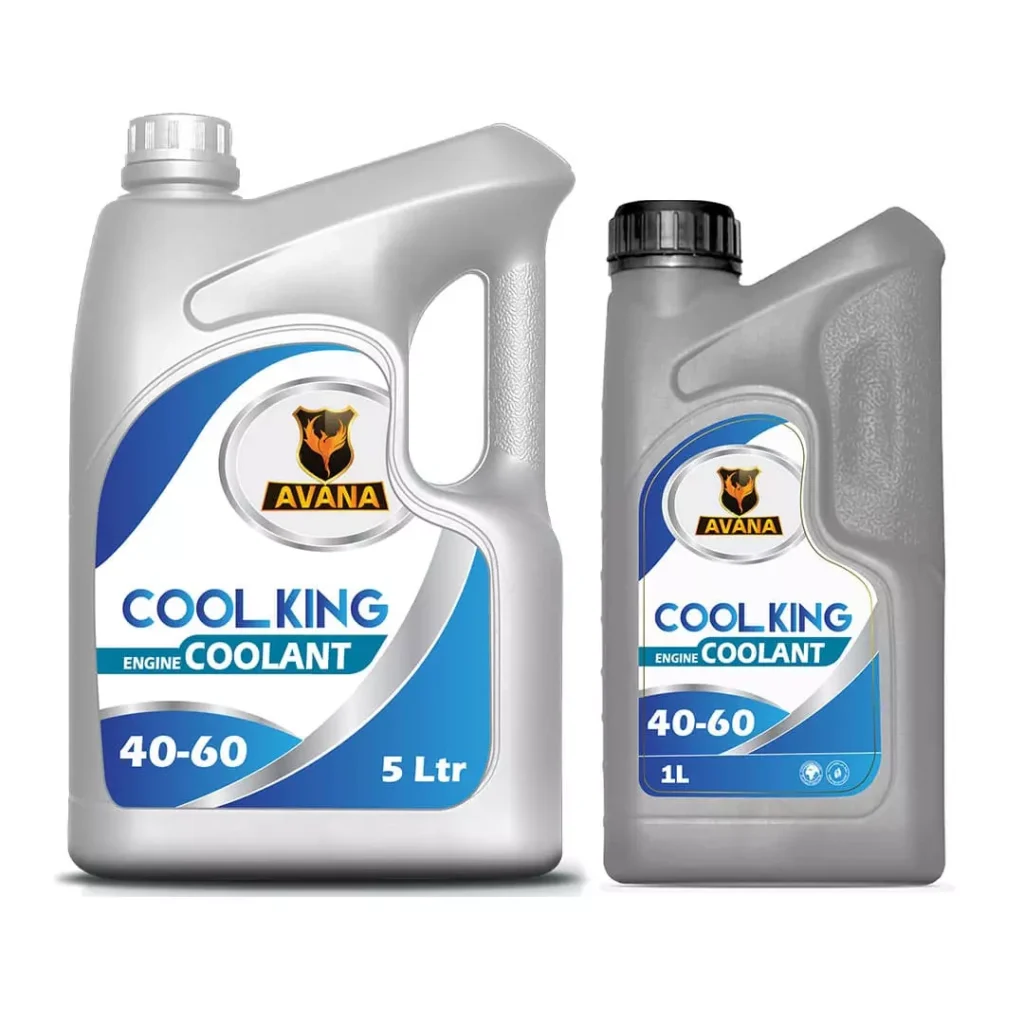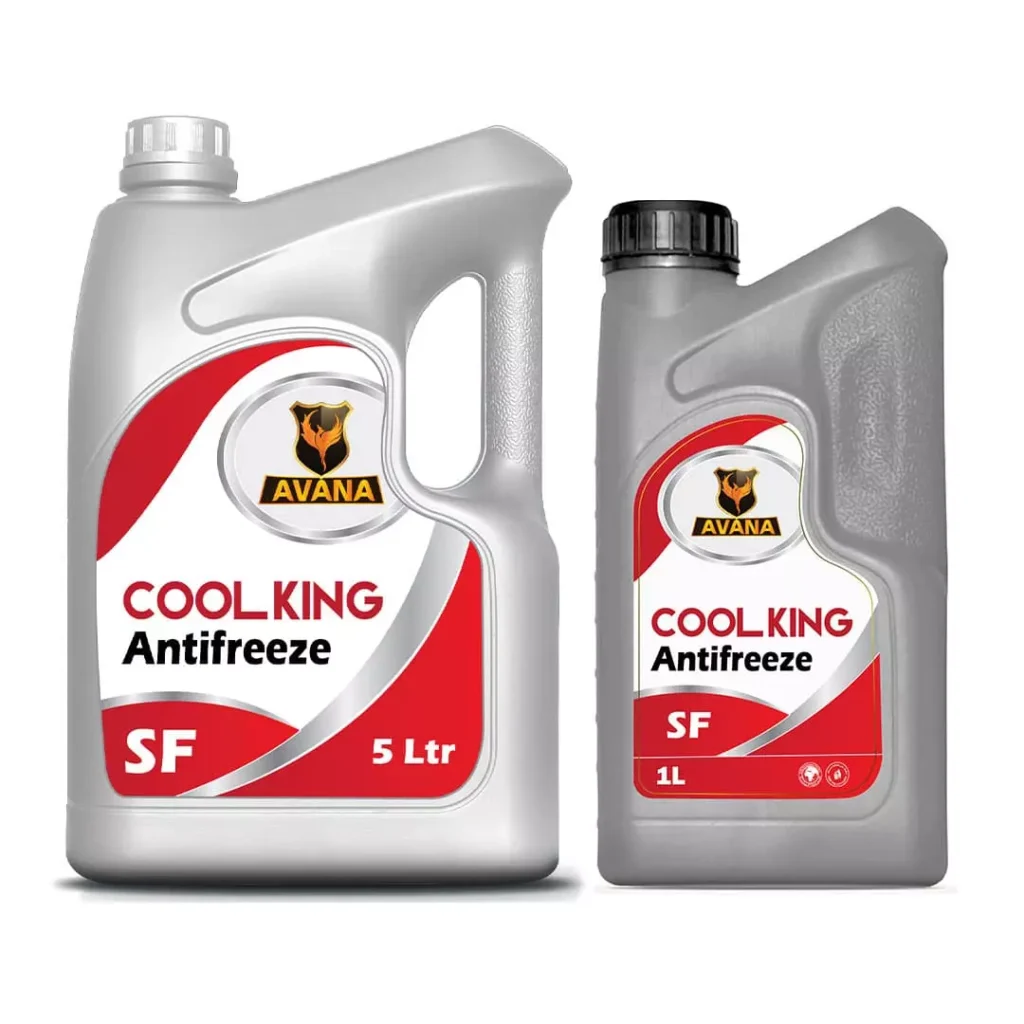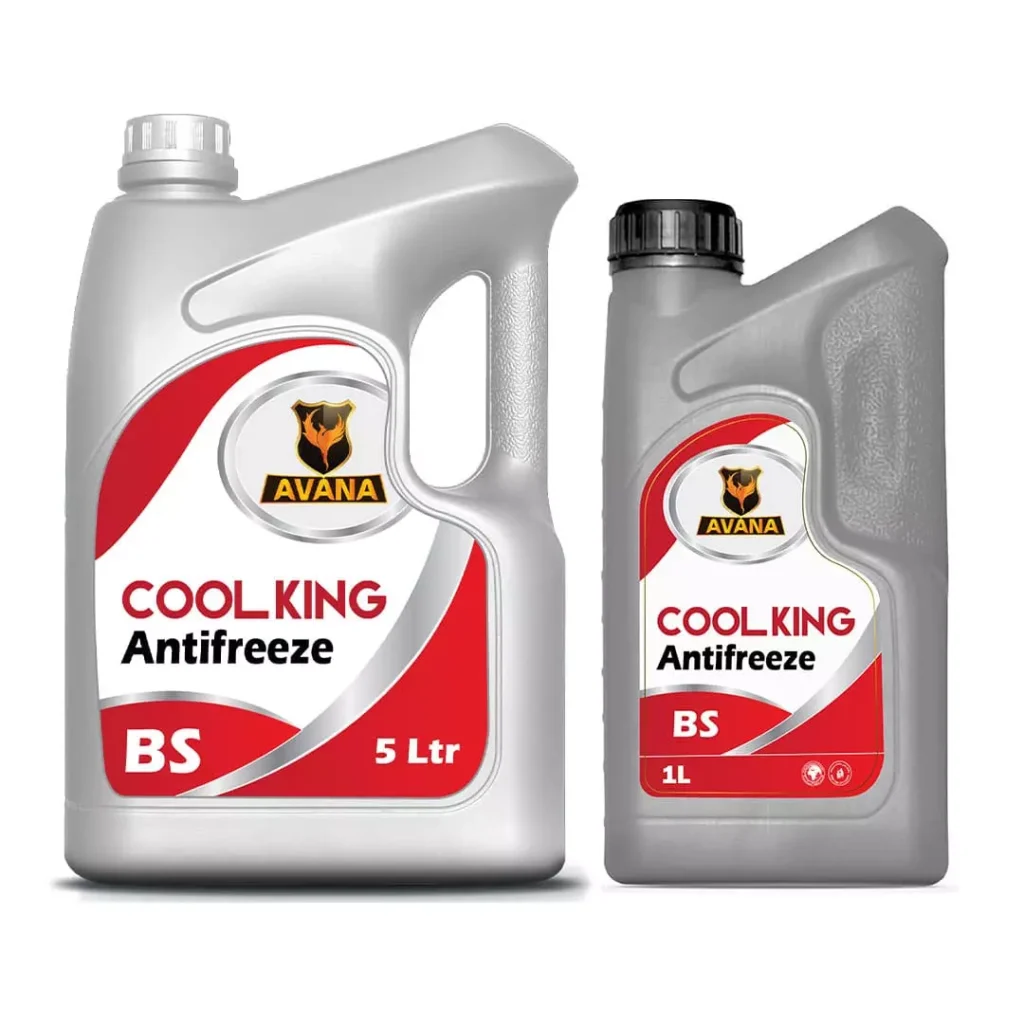COOLANT MANUFACTURER UAE
Why Choose Avana Lubricants as Your Coolant Supplier in UAE ?
In the past, we used water to cool our engines down. Nowadays, modern engines need a slightly more complex liquid with better cooling characteristics than water. It’s called a coolant. It’s a green fluid that goes into a reservoir in our cars. But it’s what keeps our engines running at optimum temperatures without them blowing up. The coolant is usually a mildly viscous liquid. It flows smoother than water but it feels more greasier as well. It enables heat transfer as it flows through an engine. Taking the heat away and transferring it to air through a radiator.
Coolant is normally used to control the temperature level in automobile engines and to prevent it from overheating. Coolant fluid continuously circulates through the engine and radiator thereby it absorbs the heat produced inside the engine and dissipates that heat when it reaches the radiator. This is why coolant is an essential part of your vehicle’s maintenance routine.
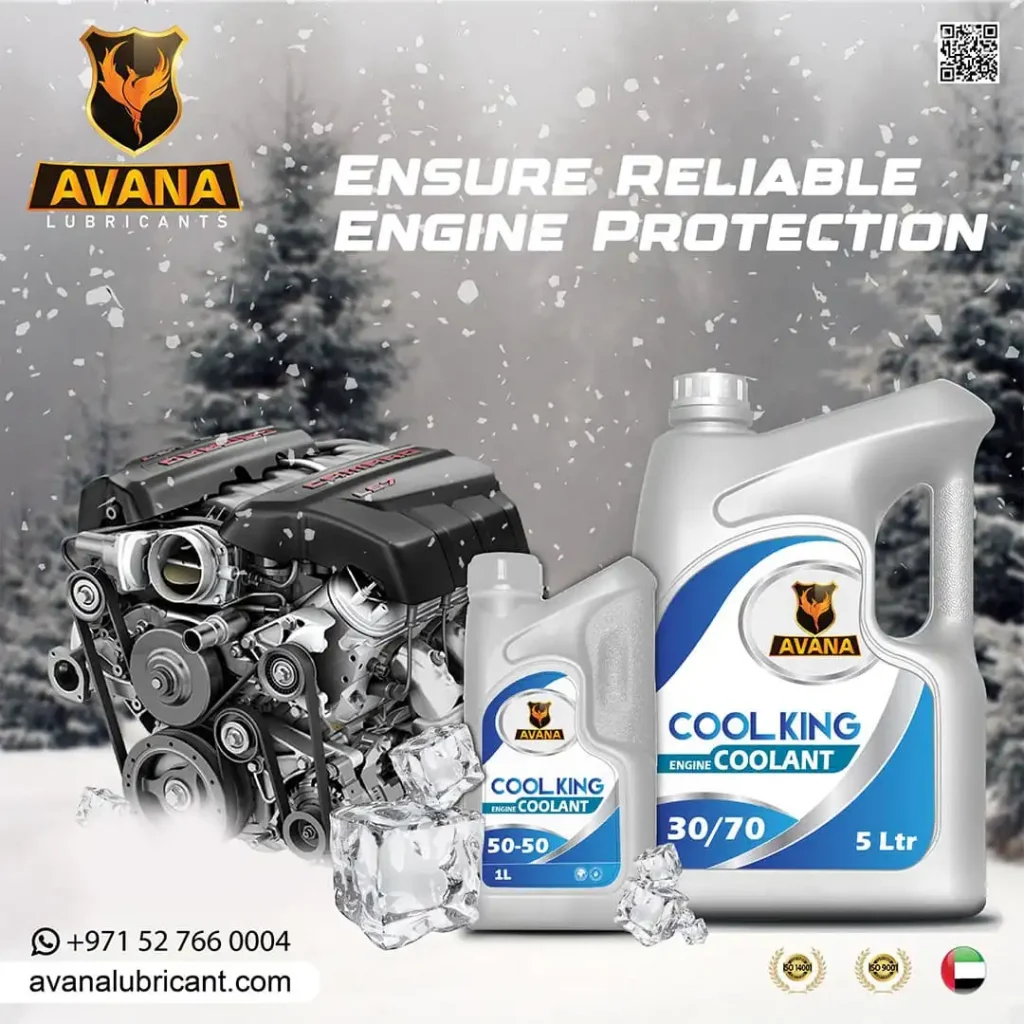
Avana Lubricants offers top quality coolant solutions that can meet the cooling requirements of automobile engines and also meet the specifications of various engine manufacturers and industry standards. Avana Lubricants has a professional research and development (R&D) team which helps to formulate premium grade coolants that can offer exceptional cooling properties and also help to extend engine lifespan.
Major Coolants Manufactured at Avana Lubricants
50/50 Coolant
Avana Coolant 50/50 is formulated using mono ethylene glycol and deionized water in 50:50 ratio, which means it is formed by mixing 50% of mono ethylene glycol and 50% deionized water. So that it has the ability to to protect engine and cooling system from freezing when temperature goes down to -37°C. Avana Coolant 50/50 is made with organic acid technology (OAT) which helps to provide full protection to the entire cooling system of a vehicle from corrosion and so that it is highly suited for modern vehicles that come with aluminium made cooling systems.
40/60 Coolant
Avana Coolant 40/60 is formulated using mono ethylene glycol and deionized water in 40:60 ratio, which means it is a solution with a combination of 40% of mono ethylene glycol and 60% deionized water. This 40:60 ratio premix form helps the coolant solution to maintain it’s liquid state even under extreme cold weather conditions and it has the ability to protect engine and cooling system from freezing when temperature goes down to -25°C
30/70 Coolant
Avana Coolant 30/70 is formulated using mono ethylene glycol and deionized water in 30:70 ratio, which means it is a solution with a combination of 30% of mono ethylene glycol and 70% deionized water. Avana Coolant 30/70 has the ability to protect engine and cooling system from freezing when temperature goes down to -67°C
SF Antifreeze
Avana SF Antifreeze is a silicate free Antifreeze solution which means it does not contain any silicates or other inorganic chemicals that can cause corrosion to the cooling system of a vehicle. SF Antifreeze formulated under an organic acid technology (OAT) which ensures completion protection to the coolant system.
BS Antifreeze
Avan BS Antifreeze meets the British Standard (BS) 6580 specification for an engine coolant. It is formulated using mono ethylene glycol solution and advanced additives and inhibitors. BS Antifreeze is used in a wide range of vehicles such as cars, trucks, vans, buses, and tractors. It can also be used in stationary engines, such as those used in generators and compressors.
Our premium grade coolants has excellent qualities like rapid heat dissipation capability, prevent engine overheating and control engine temperature.We also understand the importance of sustainability in today’s world and are fully committed to producing eco-friendly lubricant products. That’s why we offer a wide range of eco-friendly coolant products which are manufactured through an eco-friendly process which are not at all harmful to our environment.
Our coolant is not only suited for automobiles but also can be used in other diversified applications like marine, industrial, agricultural etc. Different applications has unique cooling requirements and our team of experts developed a series of coolant grades that meet those unique and different requirements.
Major Features of Choosing Avana Coolants
Excellent Heat Dissipation
Automobile engines usually generate heat when they operate and this can lead to engine component damages and also affect engine lifespan. Therefore, it’s essential to have a coolant system in automobiles. Coolant fluid in the coolant system will absorb excess heat generated inside the engine and dissipate that heat through the radiator thereby helping to prevent overheating and maintain an adequate operating temperature inside engines.
Extended Engine Lifespan
Overheating is a common issue that appears inside automobile engines and if it is not controlled then it can lead to damage to the engine parts and will affect the lifespan of engines. By using our coolant will help to ensure proper operating temperature and protect the engine from overheating thereby which helps to extend engine life.
Corrosion Resistance
Avana coolants are specially formulated with anti-corrosion additives that can protect your automobile engines from the harmful effects of corrosion. Corrosion on engines can damage the crucial parts & components and will affect the lifespan of engines. So it is important to use a coolant to prevent the engine and its components from corrosive attacks.
Protection Against Freezing
In winter there is always a chance of engine freezing and it can damage the components. Using Avana coolant will help to prevent the engine from freezing and will help to maintain an adequate level of temperature inside the engine.
Improved Fuel Efficiency
Avana coolant helps to enhance fuel efficiency by maintaining the ideal operating temperature inside the engine. During cold weather conditions our coolant circulates less efficiently around the engine otherwise the fuel doesn’t burn completely and it results in higher fuel consumption. Similarly during extreme hot conditions our coolant circulates continuously around the engine and helps to maintain the required operating temperature and prevent engine from overheating thereby it helps to improve the fuel efficiency.
Reduced Emissions
Avana Coolant indirectly helps to reduce the emission by controlling the temperature inside the automobile engines. Our coolant helps the engine to operate under the specified operating temperature which can lead to an increase the fuel efficiency. Efficient combustion of fuel at an adequate temperature level helps to reduce the unburned hydrocarbons and other pollutants, which finally results in reduced emissions.
Extended Maintenance Intervals
Avana Coolant can extend the lifespan and longevity of automobile engines and it’s components by controlling the operating temperature inside the engine in all extreme conditions. Controlled temperature levels can lead to less damage and which helps to increase maintenance intervals.
Cooling System Efficiency
Avana coolant also helps to increase the efficiency of the cooling system by ensuring proper heat absorption and dissipation. Our coolant is highly capable of maintaining ideal operating temperature inside the engine as well as the cooling system.
Frequently Asked Questions (FAQ)
No, coolant brands are not the same. Coolants manufactured by different companies has different properties in terms of formulation, additives used, compatibility, performance standards, industrial specification etc. So it’s important to buy a coolant based on the needs and requirements of your cooling system and also check the manufacturer’s recommendations and guidelines.
Water is the most commonly used coolant. Water freezes at 0 °C (32 °F) and boils at 100 °C (212 °F) so it can’t be used for every application because in most of cases where a coolant needs to cope with extreme low and hot temperatures
Coolants are commonly used in the automobile industry. Apart from water, ethylene glycol-based coolants are mostly used in automobiles because of its capability to withstand extreme temperatures and prevent engines from freezing and overheating issues.
There is not an accurate answer to which colour coolant is best, because the colour of coolant is not a primary indicator of its quality or performance. Coolant with different colours indicates that they are made for specific applications, in other words coolant with different colours are suited for different types of engines and machines.
Normally the colour of the coolant is determined by additives used by the manufacturer and coolants are made with various colours like green, orange, yellow, pink, blue etc. The most important thing to consider when choosing a coolant is the type that is right for your vehicle or application.
Some of the common colours and types of coolant are:
- Green: Green colour coolant is the most commonly used and traditional colour of the coolant. Green colour coolant is manufactured using inorganic additives technology (IAT) and these chemicals can be corrosive to aluminium and other metals, so IAT coolant should not be used in newer vehicles with aluminium cooling systems. Green colour coolant will depletes overtime and needs to be changed every two years or 60,000 miles
- Orange: Orange colour coolant is a new type of coolant that’s manufactured using Organic Acid Technology (OAT). Due to the presence of organic acids, it can provide long lasting protection for the cooling system and it can last up to 5 years or 100,000 miles. Orange colour coolant does not contain silicates and phosphates so it can be used in vehicles with aluminium cooling systems.
- Red: Red colour coolant is also manufactured using Organic Acid Technology (OAT) to provide long lasting protection for the cooling system. Red colour coolants do not have any corrosive effects against aluminium when compared with green colour coolants. Red colour coolant can last for more than 5 years and 150000 miles.
- Purple: Purple colour coolant is manufactured using hybrid organic acid technology (HOAT) and it is also called SOAT (Silicate Organic Acid Technology) Coolant. Purple coolant can be considered as a combination of inorganic acid technology (IAT) and organic acid technology (OAT) coolants. Due to the presence of silicate and other acids, purple colour coolants are compatible with older and newer vehicles. Purple colour coolant can last up to 5 years or 150000 miles
- Blue: Blue colour coolant is manufactured using inorganic additive technology (IAT) to provide protection for the cooling system. Blue coolant also contains silicates and phosphates that can cause corrosive effects in aluminium coolant systems. Blue coolants can only last for a maximum upto 2 years or 60000 miles.
- Yellow: Yellow colour coolant is manufactured using hybrid organic acid technology (HOAT) to provide long lasting protection for the cooling system. Yellow colour coolants are compatible with older and newer vehicles and it can last up to 8 years or 250000 miles
- Pink: Pink colour coolant is also manufactured using hybrid organic acid technology (HOAT). Pink colour coolant comes with phosphates and organic acid to prevent corrosion and is compatible with old and modern vehicles.
Engine coolants are normally manufactured with no expiry date and it has an infinite shelf life if it remains stored in the original sealed bottle. But the expiry time period or shelf life will start to vary once it is used and start lubricating through engine parts.
Engine coolant can last for a minimum of 2 years and maximum of 5+ years after it is used in a vehicle, it depends on the formulation, type, concentration, and quality of the coolant, as well as the storage and usage conditions
Coolant does not have any effect with the AC (air conditioning) system of a vehicle. Coolant is purely used to regulate and control the operating temperature of an automobile engine. The AC system of a vehicle has its own cooling system.
No, you can’t add water to engine coolant because coolants are already comes with premix form of mono ethylene glycol and deionised water, so it is not recommended to add normal water to coolant because normal water contains so many minerals that can cause corrosion to the cooling system of your vehicle and will create overheating issues.
By diluting coolant with water can cause significant reduction in performance
You can dilute coolant with water in an emergency situation but you should use distilled water instead of normal water, because distilled water does not contain any minerals which can cause corrosion. Once you have added water to your coolant, it is important to have the coolant system flushed and refilled with fresh coolant as soon as possible. This will help to remove any impurities from the system and ensure that your engine is properly protected.
There are mainly three types of coolants available in the market.
- Inorganic acid Technology (IAT) Coolant:
This is the most common and oldest form of coolant mainly used in old vehicles. IAT coolant comes with green colour and it contains silicates and phosphates which can cause corrosive effects on aluminium cooling systems, so IAT coolant should not be used in newer vehicles with aluminium cooling systems.
2. Organic Acid Technology (OAT) Coolant:
OAT coolants are newly designed to remove the corrosion effects on aluminium coolant systems. OAT coolants are commonly used in modern vehicles with aluminium cooling system and it comes in red or orange.
3. Hybrid Organic Acid Technology (HOAT) Coolant:
HOAT coolant is a hybrid of IAT and OAT coolant. HOAT coolant is formulated with silicates and organic acids and it is fully compatible with both older and newer vehicles. HOAT coolant is come with pink,yellow or blue colour.
No, It is not recommended to mix red colour coolant with blue colour coolant because both coolants are formulated with different blending process. Red colour coolant is manufactured using organic acid technology (OAT) and blue colour coolant is manufactured using hybrid organic acid technology (HOAT) formulation. So by combining these two different coloured coolant can cause changes to its overall chemical formula and it also changes its liquid form to gel form, which can cause blockage and affect the flow of coolant inside the cooling system and finally result in corrosion and overheating issues.
Every Coolant that is available in the market is always better than water. Coolants are normally formulated with water and additives such as ethylene glycol or propylene glycol, which gives coolants higher boiling point and lower freezing point properties than water. So coolants are always a better choice for your engines in both extreme hot and cold conditions.
Coolants also contain anti-corrosion inhibitors that help to protect your engine from rust and other forms of corrosion. Water, on the other hand, is corrosive and can damage your engine over time.
Yes. Brand consideration will play a crucial role in choosing a coolant for your vehicle in order to get best performance and protection. Every brand uses unique additives and their own formulation and blending methods which will determine how well they protect your cooling system from corrosion, scale buildup, and overheating. A highly reputed and established brand has an advanced R&D department to develop and formulate coolants and other lubricant oils that meet industry standards and engine manufacturer requirements. They also conduct real time testing inorder to understand its durability and depletion level. So by using a coolant from a trusted brand ensure the proper functioning of your cooling system and through which it will protect your engine.
However, it's important to check the manufacturer's recommendation for coolant type and change intervals, as well as to consider factors like the type of engine or equipment you're using, environmental conditions, and any warranty requirements when selecting a coolant brand.
Two other names for coolant are:
Antifreeze
Engine coolant
Antifreeze is a common name for coolant because it helps to prevent the coolant from freezing in cold weather. Engine coolant is a more specific name that refers to the coolant that is used in car engines.
Other names for coolant include:
- Radiator fluid
- Coolant/antifreeze
- Engine coolant/Antifreeze
- Cooling Fluid
These names are all interchangeable and can be used to refer to the same type of fluid.
Coolants are normally compatible with all types of cooling systems and any make or model of vehicles and equipment.
Different brands may use different colours for their universal coolants, such as yellow, blue, orange, red, purple, pink etc. So it’s not possible to say a particular colour which is used for universal coolant.
Yes. You can use pink or blue coolant depending on your vehicle’s cooling system, make, model and also based on manufacturer recommendations. Pink colour coolant is specially designed to use in vehicles with aluminium cooling systems.
In some cooling systems it is possible to use either pink or blue coolant but in most cases there must be a specific type of coolant recommended by the manufacturer.
Best way to check your vehicle's owner's manual to make sure you are using the correct type of coolant
Coolant can deplete quickly due to several reasons such as coolant leak, overheating, blown head gasket, cracked radiator, evaporation, internal engine issues and incorrect coolant mixture.
Yes. Coolant can last for 10 years but it depends on few factors like type of coolant, operating conditions, coolant concentration
Timely cooling system maintenance etc.
Coolant does not have any effect on fuel efficiency, but it can affect when the cooling system of a vehicle is managed poorly and coolant level is low such instances can affect fuel efficiency. Low coolant level will affect the cooling system and it can’t control the temperature inside the engine, which will lead to overheating and finally increase the fuel consumption.
It is important to check the quality of coolant in your vehicle on a timely basis. Some of the major step for quality check inspection are
- Visual Inspection
- Check coolant level
- Check coolant concentration
- Check the smell and colour texture
Coolants play a crucial role in controlling the operating temperature inside automobile engines. Coolants help the engines from overheating and freezing as well as from corrosion and deposits. But the coolant can lose its effectiveness over time and it starts to deplete. Normally it is recommended to change your coolant once every 30000 to 50000 miles or 2 to 6 years. However newly formulated coolants can last for up to 150000 miles or 10 to 15 years.
Anyway it is always better to follow manufacturer recommendations and check the owners manual to get a detailed idea about coolant changing time intervals.
If the coolant is low then there will be no control of the overall temperature inside the engine, which can lead to overheating and heavy damage to the engine’s.
Coolants indirectly improve engine performance, not directly. A well maintained cooling system can ensure an engine is running under its optimum operating temperature, which can lead to improve the engine performance and fuel efficiency.

